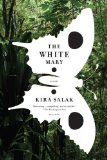Summary | Excerpt | Reading Guide | Reviews | Beyond the Book | Read-Alikes | Genres & Themes | Author Bio

A Novel
by Kira SalakThis article relates to The White Mary
Geography
New Guinea, the second largest island in the world*, is situated approximately
150 miles (240 kilometers) north of Australia.
The
Independent State of Papua New Guinea (aka Papua New Guinea or PNG)
comprises the eastern half of the island. (The western half is the Indonesian
state of Irian Jaya.) PNG has an area of 178,703 square miles (462,860 square
kilometers) – about the size of California – with a population of 6.3 million
people (2007).
Early Exploration
Archeological evidence suggests the island was inhabited approximately 50,000
years ago by Asian settlers. The first recorded contact with Europeans didn't
come until Portuguese explorer Jorge de Meneses "discovered" it in 1527. De
Meneses dubbed the island Ilhas do Papuas – "The Island of the Fuzzy Hairs."
Later, Spanish explorer Inigo Ortiz de Retes named it New Guinea, because he
thought the people similar to those of Guinea in Africa.
New Guinea was visited by Europeans only sporadically until 1824, when the Dutch
claimed the western half of the island, seeking to expand its Dutch East India
Company. Germany took possession of its northeast quarter in 1884, with the
British laying claim to the southeast quadrant that same year.
In 1906, British New Guinea became Papua, and its administration was taken
over by newly-independent Australia. When World War I broke out, Australian
troops invaded the German territory to the north, expelling the Germans from the
island. The League of Nations officially ceded Papua to Australia in 1920. The
Japanese occupied the north coast of New Guinea during World War II, but it
reverted to Australian control at the end of the war. Australia allowed the
territory self-government in 1973, with full independence following on 16
September, 1975.
Culture
PNG is one of the most culturally diverse countries on Earth. Although English
is its official language, it is the primary language of only about 1-2% of the
population. The area has more than 850 indigenous languages (12% of the world's
total). There are thousands of small tribal groups throughout the country, most
comprised of only a few hundred individuals in isolated villages. 85% of the
inhabitants live in traditional subsistence agricultural societies. 96% of the
population identify themselves as Christian (representing a wide range of
denominations), but religious practice is often mixed with traditional tribal
rituals.
Resources
Although PNG is rich in natural resources, it's been unable to capitalize on
them. A rugged mountain range bisects the country, running west to east across
its entire length. Most of the territory is covered with tropical rainforest,
with very large, swampy wetlands interspersed as well. These features have made
transportation and infrastructure development difficult. Port Moresby, its
capital and largest city, isn't linked by road to any other major town. Many
remote villages can only be reached by foot or light aircraft. These factors
have also led to its being one of the world's least explored areas.
Tourism
Tourist visits to PNG are currently discouraged by most agencies. Low-scale
tribal warfare has been ongoing for thousands of years. The advent of modern
weaponry has increased local violence dramatically. As more people have migrated
to the urban areas, lawlessness has followed. The
Lonely Planet website warns, "Papua New Guinea is troubled by a high level
of serious crime, particularly in the urban centres of Port Moresby, Lae and Mt
Hagen. Travelers should use common sense to avoid any trouble - don't travel at
night and respect any local advice regarding safety. All travel to the Highlands
region, except on essential business, should be reconsidered because of high
levels of crime and inter-tribal violence."
Interesting links:
PNG Pictures:
Filed under Places, Cultures & Identities
![]() This "beyond the book article" relates to The White Mary. It originally ran in August 2008 and has been updated for the
September 2009 paperback edition.
Go to magazine.
This "beyond the book article" relates to The White Mary. It originally ran in August 2008 and has been updated for the
September 2009 paperback edition.
Go to magazine.
Your guide toexceptional books
BookBrowse seeks out and recommends the best in contemporary fiction and nonfiction—books that not only engage and entertain but also deepen our understanding of ourselves and the world around us.